-
The STEAM-enhanced curriculum is taught in an authentic multi-disciplinary context, engaging young minds in real-world applications.
Beginning in Pre-K, a comprehensive arts and athletic curriculum promote health and self expression. As students grow they play on flag football, basketball and soccer teams and enjoy expanding opportunities, which include band, vocal ensemble and theatrical choir as well as award-winning drama and thespian clubs.
-
AFTER SCHOOL STUDIOS
-
ART
BEGINNERS - KINDERGARTEN ART
-
Dr. Maria Montessori said, “When a free spirit exists, it has to materialize itself in some form of work…for this the hands are needed.” She believed that “the education of the hand is particularly important since the hand is an organ of the mind, the means which the human intelligence uses to express itself." Art provides this opportunity for self-expression. In Montessori classrooms, creativit in the whole child is encouraged. This is first approached indirectly through work in the Practical Life (includes sewing and weaving) and Sensorial (exploration of the senses) areas of the classroom. Art in the Montessori classroom is another way to foster a child’s keen sense of observation, respect, understanding of the past, freedom to express one's self, appreciation of the beauty in life and to bring inner delight and self-satisfaction.
Art Appreciation: Art appreciation is taught using various means. Reproductions of art masterpieces from many eras can be seen displayed in the classroom at the children’s eye level. In works throughout the classroom, sorting and matching work using three-part cards of artists and pictures of their art work. Timelines are used to show the lives of artists and how art has evolved over the years. Allowing the children to do their own “reproduction” of a famous artist’s work is an educational and fun activity.
ELEMENTARY - MIDDLE SCHOOL ART
-
Students learn about the elements of art, principles of design, and art processes of various mediums in both two and three dimensional art forms. Students also learn to use the tools of the various art mediums. Students develop an understanding of the relationship between art and culture including art theory, art history, periods of art, art movements, art styles, subjects in art, and symbolism in art. Students will also connect visual arts to other disciplines including geometry, biology, botany, architecture, music, literature, photography, philosophy, psychology, computer technology, and construction. Students create original and unique works of art using their own creativity and imagination. Classes meet for one hour each week.
MEET THE ART TEACHER

Phone:
Email:
Degrees and Certifications:
Ms. Joanne McFarland, UPPER ELEMENTARY LEAD TEACHER, SCIENCE AND MATH; ELEMENTARY AND MIDDLE SCHOOL ART TEACHER
- B.F.A., Creative Photography, University of Florida
- Graduate Studies, Elementary Art Education, University of Florida
- Montessori 6-12 Certification
- Certified Teacher, State of Florida, K-6th
- Certified Teacher, State of Florida, K-12th (Art)
- CPR and First Aid Certified
- Hobbies: all forms of art and crafts, reading, knitting, baking
- MMS Affiliation since 2013
-
ATHLETICS
AT MILLHOPPER MONTESSORI SCHOOL, WE BELIEVE A HEALTHY BODY CONTRIBUTES TO A HEALTHY MIND. WE OFFER SEVERAL OPPORTUNITIES FOR OUR STUDENTS TO PARTICIPATE IN TEAM SPORTS OUTSIDE THE DAILY P.E. CLASSES.
Millhopper Montessori School participates in the Oak Hall Community Sports League for children in grades K-5. MMS offers school teams and onsite practices for flag football, basketball, and soccer.
FLAG FOOTBALL
-
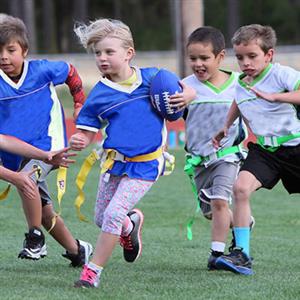
Millhopper Montessori School is participating in the Oak Hall Comunity Sports League. Oak Hall’s registration is available ONLY online (you can click here or visit www.oakhall.org, click Athletics, then Community Sports League), and will have very firm deadlines and will not accept late registrations. Once you have your information in on the Oak Hall website, you should be able to simply add additional siblings. You will have to register for each sport individually.
We will also need each family to complete a separate online registration form with us at MMS to cover our liabilities and on-site costs. Please click here to fill out the MMS form. For families with multiple children, each sibling will require their own submission.
In regards to fees, you must pay both Oak Hall’s registration fee and a separate $15 fee to MMS will be billed to your account when you turn in your online registration. MMS has to cover the equipment, staff hours and insurance fees accrued by offering on-site practice and school teams, hence the separate fee. Please note that the MMS fee has stayed low and our jerseys and trophies will be designed specifically for our students. If you have any questions regarding the sports leagues, please contact the front office at mmschool@millhopper.com. We look forward to another wonderful year of athletic achievement.
Lastly, MMS has a Cleats for Feets program. We have multiple sets of cleats your child can use for as long as they fit, then trade them back in once they outgrow them. If you have old cleats in good condition, please donate them! See Coach Helen for details. Sorry, no gym sneakers options!
GO KNIGHTS!
BASKETBALL
-
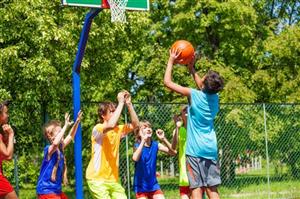
Millhopper Montessori School will be participating in the Oak Hall Community Sports League. Organized team sports will be offered to children in grades K-5. We want to be clear as to what is offered through MMS and how the registration process will work. Please be aware that MMS only offers school teams and on-site practices for flag football, basketball and soccer.
Oak Hall has an online registration process. Registration is available ONLY online (you can click here or visit www.oakhall.org, click Athletics, then Community Sports League). There will be very firm deadlines and late registrations will not be accepted. The deadline for Basketball is Friday, November 15. Once you have your information completed on the Oak Hall website, you should be able to add additional siblings if necessary. You will have to register for each sport individually.
We will also need each family to complete a separate online registration form with us at MMS to cover our liabilities and on-site costs. Please click MMS Basketball Registration Link to fill out the MMS form. For families with multiple children, each sibling will require their own submission.
Regarding fees, you must pay both Oak Hall’s registration fee and a separate fee of $15.00 to MMS, this will be billed to your account when you turn in your online registration. MMS has to cover the equipment, staff hours and insurance fees accrued by offering on-site practice and school teams, hence the separate fee. Please note that the MMS fee has stayed lowand our jerseys and trophies will be designed specifically for our students.
If you have any questions regarding the sports leagues, please contact the front office at mmschool@millhopper.com. We look forward to another wonderful year of athletic achievement.
2020 Saturday Games: 1/11, 1/25, 2/1, 2/8, 2/15, 2/22, 2/29, 3/14
GO KNIGHTS!
SOCCER
-
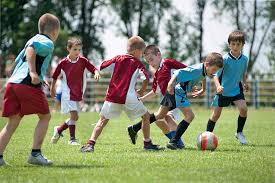
Millhopper Montessori School is participating in the Oak Hall Comunity Sports League. Oak Hall’s registration is available ONLY online (you can click here or visit www.oakhall.org, click Athletics, then Community Sports League), and will have very firm deadlines and will not accept late registrations. The deadline for soccer registration is September 14, 2020!
Once you have your information in on the Oak Hall website, you should be able to simply add additional siblings. You must register for each sport individually.
For families with multiple children participating, each sibling will require their own separate submission. In regards to fees, you must pay both Oak Hall’s registration fee and a separate fee to MMS. The MMS fee will be billed to your account when you turn in your online registration. The reason for the separate fee is because MMS needs to cover the cost of equipment, staff hours, and insurance fees accrued by offering onsite pratice and school teams.
Please note that the MMS fee has stayed low and our jerseys and trophies will be designed specifically for our students.
If you have any questions regarding the sports leagues, please contact the front office at mmschool@millhopper.com. We look forward to another wonderful year of athletic achievement.
Lastly, MMS has a Cleats for Feets program. We have multiple sets of cleats your child can use for as long as they fit, then trade them back in once they outgrow them. If you have old cleats in good condition, please donate them! See me for details. Sorry, no gym sneakers options!
GO KNIGHTS!
-
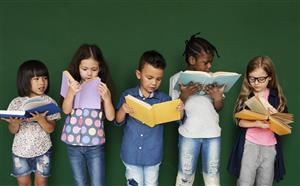
LIBRARY/MEDIA
BEGINNERS (AGES 2-4) LIBRARY/MEDIA
-
The Beginners class visits the Media Center each week for 30 minutes, reinforcing the idea that reading is special and familiarizing them with visiting the library. Story time is the focus of media lessons at this age level. The books are often chosen to tie into the cultural study currently going on in the classroom. Lessons are focused on listening skills, manners in a library setting, illustrations, and verbal interaction about the story being read. Fiction and nonfiction materials are used along with felt boards, puppets, art, and songs to foster a love of reading. The main goal at this level is to support language development and to begin an understanding of the structure and sequence of reading.
PRESCHOOL AND PRESCHOOL/KINDERGARTEN (AGES 3-6) LIBRARY/MEDIA
-
The Preschool and Preschool/Kindergarten classes have Library/Media class each week for 30 minutes. Story times in the Media Center or classroom are filled with rhymes, songs, and discussions, which help foster both vocabulary development and a love of reading. This continues to build on the skills taught at the Beginners level. In addition, Preschool and Preschool/Kindergarten students learn the parts of a book, how to care for books, authors and illustrators, and story sequencing. They are introduced to the concepts of fiction versus nonfiction and the idea that people read for many different purposes. The books are often chosen to tie into the cultural study currently going on in the classroom. Students usually have time to choose a book on their own and often bring it to the Media Specialist to read.
LOWER ELEMENTARY (AGES 6-9) LIBRARY/MEDIA
-
Media classes are held each week for 30 minutes. Reading and literature appreciation lessons are interspersed with lessons on library and research skills. Students are taught about the various sections of the library, how to navigate the library, and the computer skills required to find the books they want. They learn the parts of a book, explore types of fiction and nonfiction, and learn and practice different reading strategies. Lessons may also include games, hands-on activities, and scavenger hunts to reinforce the teaching and to address different learning modalities. Book talks and book fairs are held at various times during the year to encourage our students to become avid readers. Students may also check out books for personal reading or research.
UPPER ELEMENTARY (AGES 9-12) LIBRARY/MEDIA
-
Upper Elementary students visit the Media Center each week for 60 minutes. In addition to encouraging a love of reading, the goal of lessons at this level is to help students develop into thoughtful and discerning readers and information consumers. Reading and literature appreciation lessons are interspersed with lessons on library and research skills. Topics covered include locating books in the library (including the Dewey Decimal system), genres of fiction and nonfiction, conducting research, using various resources both online and in print, and evaluating those resources. Using the “Big 6” research steps, the students become more independent and problem solve their queries. Internet safety and information reliability are studied and discussed. Citation of sources is also introduced. Students actively participate through scavenger hunts, shelving, Internet activities, and games. Book talks and book fairs are an important part of the media curriculum throughout the year. Students may check out books during media hours throughout the week.
MIDDLE SCHOOL (AGES 12-14) LIBRARY/MEDIA
-
Although the Middle School students do not have a regularly scheduled Media class, skills including Internet safety, reliability, validating sources, and citing sources properly are integrated into the curriculum, building on topics taught in the earlier grades. The Media Specialist and Middle School Language Arts teacher regularly consult regarding the curriculum. The Media Specialist is available during media center hours to assist students and teachers in locating materials and conducting research. Lively discussions are encouraged, focusing on netiquette, favorite novels, research techniques, bias found in media, and technological advancements. Students are allowed to check out books during media hours throughout the week.
MEET THE LIBRARY/MEDIA TEACHER
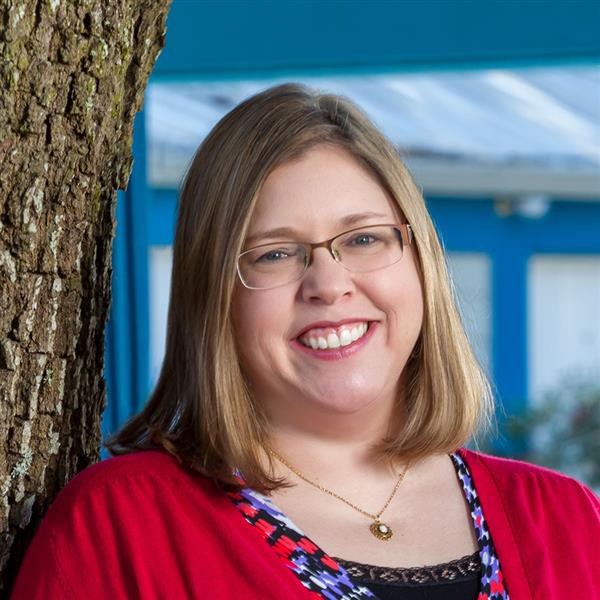
Phone: 352-375-6773
Email:
Degrees and Certifications:
Ms. Jennifer Kuntz, MEDIA SPECIALIST AND UPPER ELEMENTARY TEAM TEACHER, LANGUAGE ARTS
- B.A., English, University of Florida
- M.A., Library and Information Science, Florida State University
- Former Systems Librarian, Florida Center for Library Automation
- Former Head of Access Services, University of Florida Health Science Center Library
- Certified Teacher, State of Florida, Education Media Specialist, PreK-12
- Certified Teacher, State of Florida, English, 6th – 12th
- CPR and First Aid Certified
- Hobbies: Girl Scout Troop Leader, reading, writing, traveling
- MMS Affiliation since 2012
Phone:
Email:
Degrees and Certifications:
-
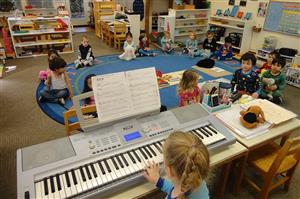
MUSIC
BEGINNERS, PRESCHOOL, AND PRESCHOOL/KINDERGARTEN (AGES 2-6) MUSIC
-
In the early childhood classes, music is comprised of fundamental lessons that prepare students to sing using proper breath support and exhibit characteristic tone quality and diction through a repertoire of age-appropriate songs and literature. Rhythmic activities incorporate kinesthetic movement to music, which enables all students to express themselves as a living component of the music. All of this is portrayed through various circle time activities.
The curriculum also contains sessions in music appreciation, refining aural perception and quality of music in addition to studying biographies of significant composers and style eras in music. There are also units on the different instrument families and their uses and function in various ensembles. Ear-training is developed through pitch matching exercises utilizing familiar songs and a simple solfege system. The creative process and critical-thinking skills are enhanced by adding or changing lyrics to familiar melodies, which begins an early introduction to composition. Students are introduced to music vocabulary, which augments their current vocabulary and enables them to begin to speak in “musical sentences.” These words become part of their everyday speech.
LOWER ELEMENTARY (AGES 6-9) MUSIC
-
Music class is based on fundamentals of music that teach students a rich and diverse music understanding. The curriculum addresses music appreciation, general knowledge of composers, styles and timelines of music eras, recognition aurally and visually of orchestral instruments, rhythm activities, proper vocal production, a repertoire of songs, and performance practice etiquette.
Lower elementary students begin to demonstrate music skills learned in Kindergarten by putting concepts and learned benchmarks into every day practice. This is accomplished through a myriad of rehearsals culminating in the annual Winter Program which occurs in the first half of the year. The technique of singing with proper fundamentals, breath support, diction, enunciation and quality of sound, phrasing, and dynamics are all applicable and demonstrated through this performance. Once the Winter Program activities have been completed, students are enveloped in music appreciation from the great masters to modern music. When applicable, cross-curricular connections are made to assist diverse learning modes.
The second half of the year allows the students to display their music knowledge and skills garnered since preschool as the students assume some of the lead roles in the end of the year production which happens every other year. Students, in a collaborative effort, learn selections in a large group setting as the the concepts of musicality, expression, timing, and movement combine to produce a refined performance. The music teacher not only works with large groups, but also spends time working with soloists, continually diversifying instruction to meet the needs of all students. In this age group, heavy focus is in the understanding and application of music theory – the study of reading, writing, and playing music.
The last third of the year is dedicated to the End of the Year Show. During this time all previously learned music skills and concepts are displayed. Vocal and facial expression are modeled by the music teacher along with rhythmic and kinesthetic motion to enhance the material being performed. Students then incorporate these skills and concepts into their individual and group performances to enhance the overall quality of each production.
UPPER ELEMENTARY AND MIDDLE SCHOOL (AGES 9-14) MUSIC
-
Classes are comprised of lessons that provide students with a rich and diverse musical understanding and appreciation. The curriculum addresses music appreciation, general knowledge of composers, styles and timelines of music eras, recognition aurally and visually of orchestral instruments, rhythm activities, proper vocal production, a repertoire of songs, and performance practice etiquette.
The educational curriculum begun in preschool continues sequentially as the student builds and continues to refine musical skills and concepts addressed in earlier years. The knowledge of orchestra instruments is now expanded to include concert band, jazz band, and even digital instruments. Recognition of musical dynamics now includes correct spelling and written definitions. This continues the cross-curricular concepts (English, grammar) introduced earlier. The reading of notation in both treble and bass clef along with definitions and enhanced fundamentals of music are demonstrated and built upon in preparation for a Spring Concert and a End of the Year Show that is structured every other year.
MEET THE MUSIC TEACHER
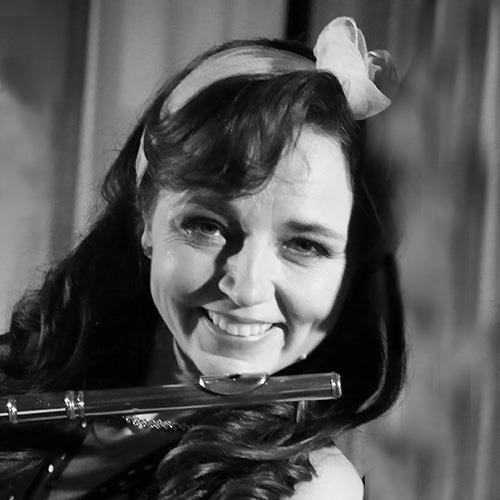
Phone: 352-375-6773
Email:
Degrees and Certifications:
Ms. Gosia Sobala, MUSIC TEACHER
- M.A., Music Performance, Florida State University
- B.A., Music Performance, University of Florida
- Former Music Teacher at MMS for 6 Years
- Former Music Teacher at Brentwood School for 20 Years
- Former Music Teacher at Expressions Academy of Arts for 1 Year
- Private Flute Teacher for 30 Years
- Performs with Her Husband Ali (Gosia and Ali) for 20 Years
- Performed with the Gainesville Orchestra, Ocala Orchestra and the Florida Lakes Symphony in Mt. Dora
- Hobbies: Biking, Gardening
- Grandmother of two Millhopper Montessori students
- MMS Affiliation since 2002
-
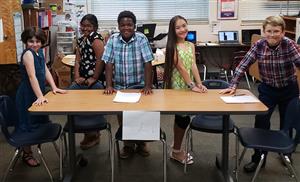
PERFORMING ARTS
Speech, Debate, and Drama are integral parts of the curriculum at Millhopper Montessori School for all 1st through 8th grade students. The 1st through 5th grade are given thirty minutes of instruction each week, while middle school students receive an hour of instruction each week.
Speech & Public Speaking are taught to ease the students into speaking in front of groups. In 1st through 3rd grades they learn delivery techniques by reading from their journals and presenting poems or stories. The 4th and 5th graders begin to write their own speeches and deliver them. In 6th through 8th grades, the students learn to write various speeches and deliver them in various styles. By 8th grade, the students deliver their speeches extemporaneously using a keyword outline and also deliver a five minute impromptu speech. Lessons of voice projection, varying tones, and proper body language, as well as not fidgeting and being prepared, begin in the 1st grade and continue through 8th grade.
Debate teaches formal discussion of various opinions. The 1st through 3rd graders learn to make informed opinions by discussing the differences between gathering information before the opinion is formed and making an opinion without knowing all the facts. 4th and 5th graders, in opposing teams, research a simple issue, formulate an opinion, and write an introduction, talking points with backing research, and a conclusion before presenting a debate. The middle school students spend weeks researching a current event, environmental issue, or historical issue and present a formal debate to the 1st through 5th grade students every other year.
Drama teaches students the creative process of acting, auditioning, script-writing, and presenting a show. Every other year the students in 1st through 5th grades learn and recite Shakespeare using the “Shakespeare Can Be Fun” series that retells the stories in rhyme. The middle school creates a theatrical portfolio that includes: a re-written scene, cultural overview, props, characterization, and costumes. Their hard work and re-written scenes are presented at the Shakespeare Festival. Every other year the students present an End of the Year Show presented at a community theater, such as Eastside High School’s Theater.
MEET THE SPEECH/DRAMA/DEBATE TEACHER
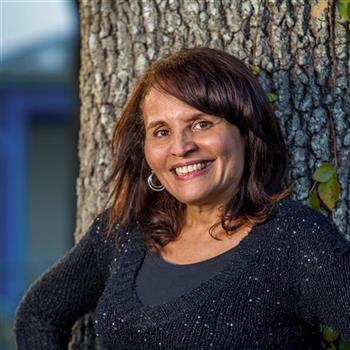
Phone:
Email:
Degrees and Certifications:
Ms. Ms. Sylvia Aslanian, SPEECH/DRAMA/DEBATE
- A.S. Technology, Visual Communications
- B.S. Information Technology, Member of Epsilon Pi Tau (The International Honor Society for Professions in Technology)
- Director of
-
- Biennial Shakespeare Festival
- Biennial Festival of Dionysus
- Biennial Year End Show
- MMS Spotlight Kids Performing Arts Troupe
- Developer
- MMS Technology & Computer Science Curriculum (based on National Technology Education Standards
- MMS Speech and Debate Curriculum (based on National Middle School Public Debate Program)
- MMS Drama Curriculum (based on Montessori Curriculum and National Standards)
- Theater Memberships
- Educational Theater Association
- Alliance for Theatre and Education
- Theater Communications Group
- FATE (Florida Association for Theatre Education)
- Parent of two Millhopper Montessori alumni
- MMS Affiliation since 1994
DEBATE
-
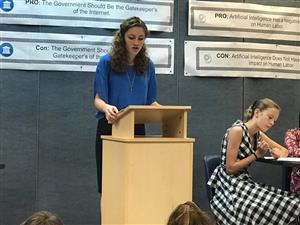
All students in 1st-8th grades learn how to formally present an argument that includes research and persuasive writing. Every other year, Middle School students prepare a formal debate and present the debate to family, friends and the 1st-5th grades.
END OF THE YEAR SHOWS
-
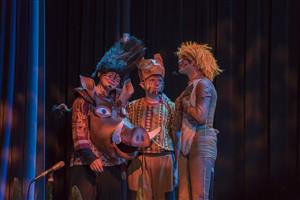
Every other year students in 1st - 8th grades perfrom a year end show. Past shows have been: "Mulan Jr," "Homeroom the Musical," "Lion King Kids," and more.
FESTIVAL OF DIONYSUS
SHAKESPEARE FESTIVAL
-
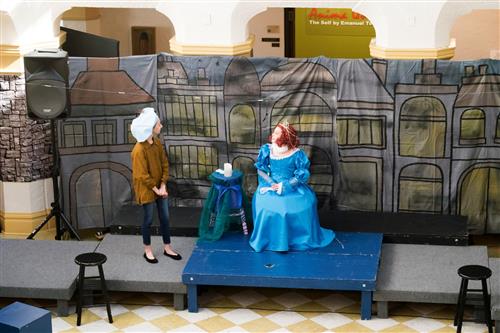
Every other year, Millhopper Montessori School's middle school students "Rocks The Bard" with their Shakespeare Unit in Literature. They read several of Shakespeare's plays and sonnets, study cultural aspects of the time, and learn about the life of William Shakespeare.
Creating a Theatrical Portfolio, the students rewrite their own scene from one the playwright's tales. This portfolio includes a cultural overview of the scene and play, a re-written script, character analysis and description, a props list, and a costume sketch. In Drama class, they bring their scripts to life and prepare to perform their scenes in a Shakespeare Festival at the Thomas Center, Spanish Court. The festival is performed for elementary students and is designed to teach the younger students all about The Bard.
THE SPOTLIGHT KIDS PERFORMING ARTS
-
The Spotlight Kids Performing Arts offers two after school drama clubs at Millhopper Montessori School.
For more informaton visit: The Spotlight Kids Performing Arts
SUMMER THEATRE INTENSIVES
-
Millhopper Montessori School offers several Summer Theatre Intensives that are available to all area students, even if they are not enrolled as a Millhopper Montessori School student during the school year.
-
PHYSICAL EDUCATION
The focus of the MMS Physical Education Program is to help children create a healthy foundation of fitness for life by providing exposure to a wide range of activities and sports while making fitness fun and enjoyable. Students will be assisted in working towards meeting physical fitness standards and will participate in other fitness programs such as Jump Rope for Heart.
BEGINNERS (AGES 2 - 4) PHYSICAL EDUCATION
-
Creative play, movement to music, and obstacle courses allow the children to explore what their bodies can do. Students are introduced and encouraged to practice locomotive activities such as skipping, hopping on one foot, and balancing during both creative movement times and playground activities. Daily outdoor playtime allows the children to develop their muscles and coordination through climbing, swinging, sliding, running, and sandbox play. (This is a part of classroom activities taught by classroom teachers, not a separate class.)
PRESCHOOL AND PRESCHOOL/KINDERGARTEN (AGES 3-6) PHYSICAL EDUCATION
-
Kindergarten classes have P.E. classes twice a week for 30 minutes each. Students are introduced to basic movements and athletic skills. The focus is on the enjoyment of participating in physical activities. Each class starts with a stretching routine that changes every quarter. The remainder of the class is devoted to skill development. Units include fundamental movements such as running, stopping, skipping, jumping, kicking, throwing, and catching. Various sports equipment is used, however, the emphasis will be on the skills and locomotive development as opposed to sport-specific skills.
LOWER ELEMENTARY (AGES 6-9) PHYSICAL EDUCATION
-
Lower elementary students have P.E. four times a week for 30 minutes each class period. The focus is on participation and discovery of activities. Some sport skills are introduced. Each day begins with a stretching and warm-up routine before students are led through games and activities to develop skills and movements. One day per week is devoted to a large group game that corresponds with the skills being developed. This provides the students an opportunity to work together and to learn how to play a specific role on a team. Cardiovascular and general fitness training are also components of the program. Sportsmanship is constantly emphasized
UPPER ELEMENTARY (AGES 9-12) PHYSICAL EDUCATION
-
Upper elementary students have P.E. four times per week for 45 minutes each class period. The focus is on team building and creating a fit lifestyle. Personal exploration of various sports and activities help students find activities that they will enjoy as they age. Each day begins with a stretching and warm-up routine that changes every six weeks. Students are led through games and activities to develop skills and movements. One day per week is devoted to a large group game that corresponds with the skills the students are working towards, which provides students an opportunity to work together and learn to play a specific role on a team. Cardiovascular and general fitness training are also important components. Sportsmanship is constantly emphasized.
MIDDLE SCHOOL (AGES 12-14) PHYSICAL EDUCATION
-
Each day begins with a stretch routine that changes every six weeks. Students are led through games and activities to develop skills and movements. One day per week is devoted to large group games that correspond with the skills being practiced. This provides students an opportunity to work together and play a specific role on a team. Sportsmanship is constantly emphasized. A separate day of the week is designated as ‘lap day’ where students run laps that are compiled each year. The goal is for each student to run a marathon over the course of the year. Students are given the opportunity to choose what equipment they would like to use during the second half of lap day. This provides exposure and gives students an opportunity to increasingly develop skills in the athletic area in which they are most interested.
MEET THE PHYSICAL EDUCATION TEACHER
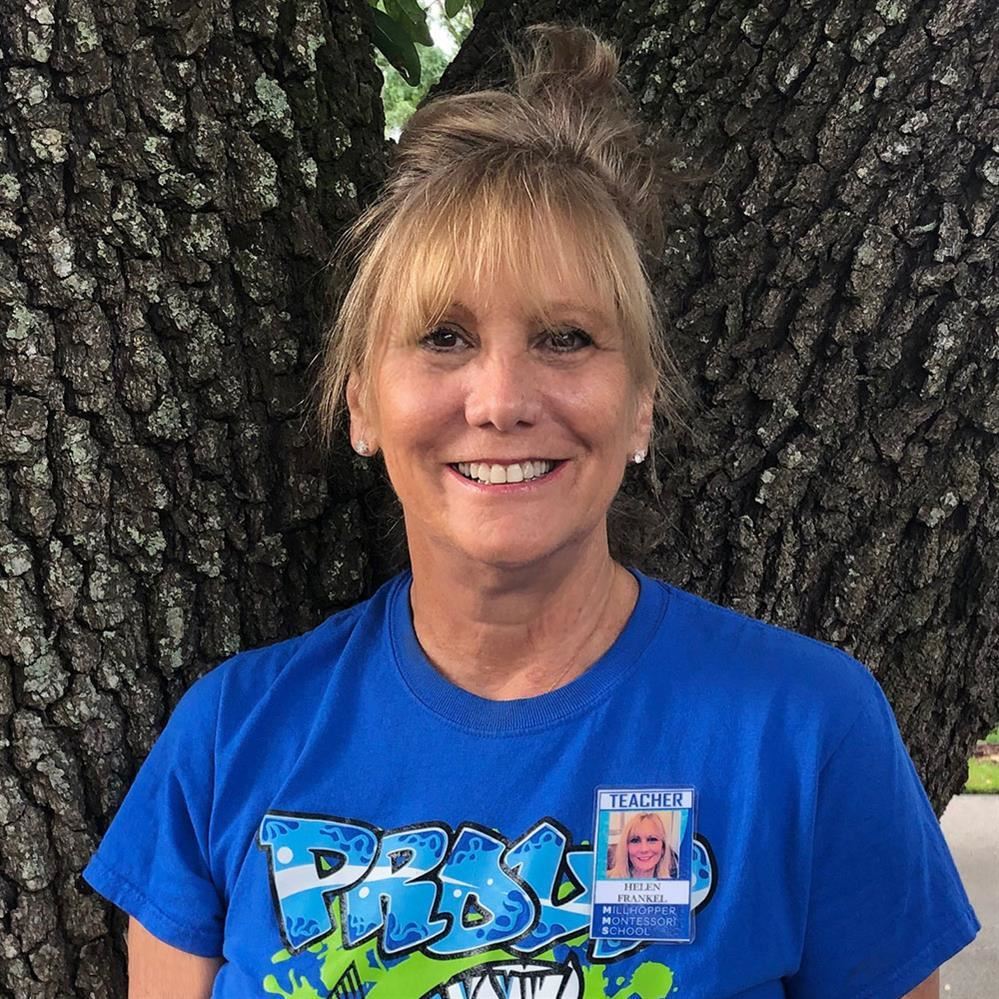
Phone: 352-375-6773
Email:
Degrees and Certifications:
Ms. Ms. Helen Frankel, PHYSICAL EDUCATION
- B.A., Psychology; Minor Biochemistry
- Former Elementary/Middle School Special Education Assistant Teacher
- Fitness Director, Personal Trainer, Group Exercise Instructor
- American Council of Exercise member
- National Fitness Trainers member
- Youth Exercise Instructor certification
- CPR and First Aid Certified
- Hobbies: Reading, walking, weight training, biking, swimming
- Grandmother of one Millhopper Montessori student
- MMS Affiliation since 2019
-
SPANISH
PRESCHOOL AND PRESCHOOL/KINDERGARTEN (AGES 3-6) SPANISH
-
Spanish is presented two times a week in 30 minute classes. Lessons are presented in an interactive format. A salutation song introduces the beginning of each class. Lessons correlate with the individual classroom thematic unit as often as possible and include vocabulary, the alphabet, and numbers; all accompanied by proper Sign Language. This encourages the students not only to think English to Spanish, but to visualize the word and to be able to say the word in Spanish. The class also constructs their own collective stories about their interests. Students are able to express their feelings when asked in a basic conversation. There are special activities, songs, and games (i.e., on parts of the body, the seasons, basic shapes and colors). The students gain confidence as each one is awarded the opportunity to lead their classmates with their favorite song at the end of each lesson.
LOWER ELEMENTARY (AGES 6-9) SPANISH
-
Students are more likely to retain information from lessons in a context that they enjoy. Students must believe that they can experience growth through learning experiences carefully designed around small chunks of meaningful language. Students in the Lower Elementary Classes (Kindergarten to 3rd Grade) are presented with lessons that emphasize conversational Spanish through the use of games (i.e., Simon Says), songs, stories, projects, and short make-believe situations. The focus is directed at purposeful conversations and activities on subjects such as health, weather, seasons, and various others. Spanish lessons are reinforced with supplemental Sign Language.
UPPER ELEMENTARY (AGES 9-12) SPANISH
-
Students in the Upper Elementary grades transition to an even greater emphasis on reading and writing in Spanish. Students are motivated to take part in Spanish class when the context through which the language is presented and practiced is meaningful. To facilitate this and give greater structure to the Spanish class, students are introduced to the Bienvenidos textbooks and workbook for the sequential grammatical mechanics of the language. They will also have projects and reading assignments from such magazines as “¿Que Tal?” and small reading books such as “Todos Necesitamos Agua.” Through engaging projects and poems, the students develop appreciation for the diversity of the world they live in, which gives them a better understanding of themselves. Students become better at speaking a new language by taking advantage of context learning and counting on their friends for help. They look for clues from what others say and make the most of what they know. After a new grammatical concept is introduced, students are often paired with a peer to participate in projects and activities. The goal is that every student maximizes his/her own communicative competence in Spanish and succeeds while also enjoying this skill.
-
The sixth through eighth grade use the ¡Avancemos! curriculum. The Spanish program includes a variety of proficiency-building activities as well as supplementary cultural materials. Students are taught Spanish using a variation of the “Direct Method.” This means that the instructor teaches the language using the target language as much as possible. This technique is effective because the students are able to hear the target language in a variety of “real life” situations in meaningful and useful ways. A “Communicative Competency” approach to language learning supports the use of this method. The Spanish curriculum is covered over a three-year period:
6th Grade: Spanish I
7th Grade: Spanish II
8th Grade: Spanish III
MEET THE SPANISH TEACHERS
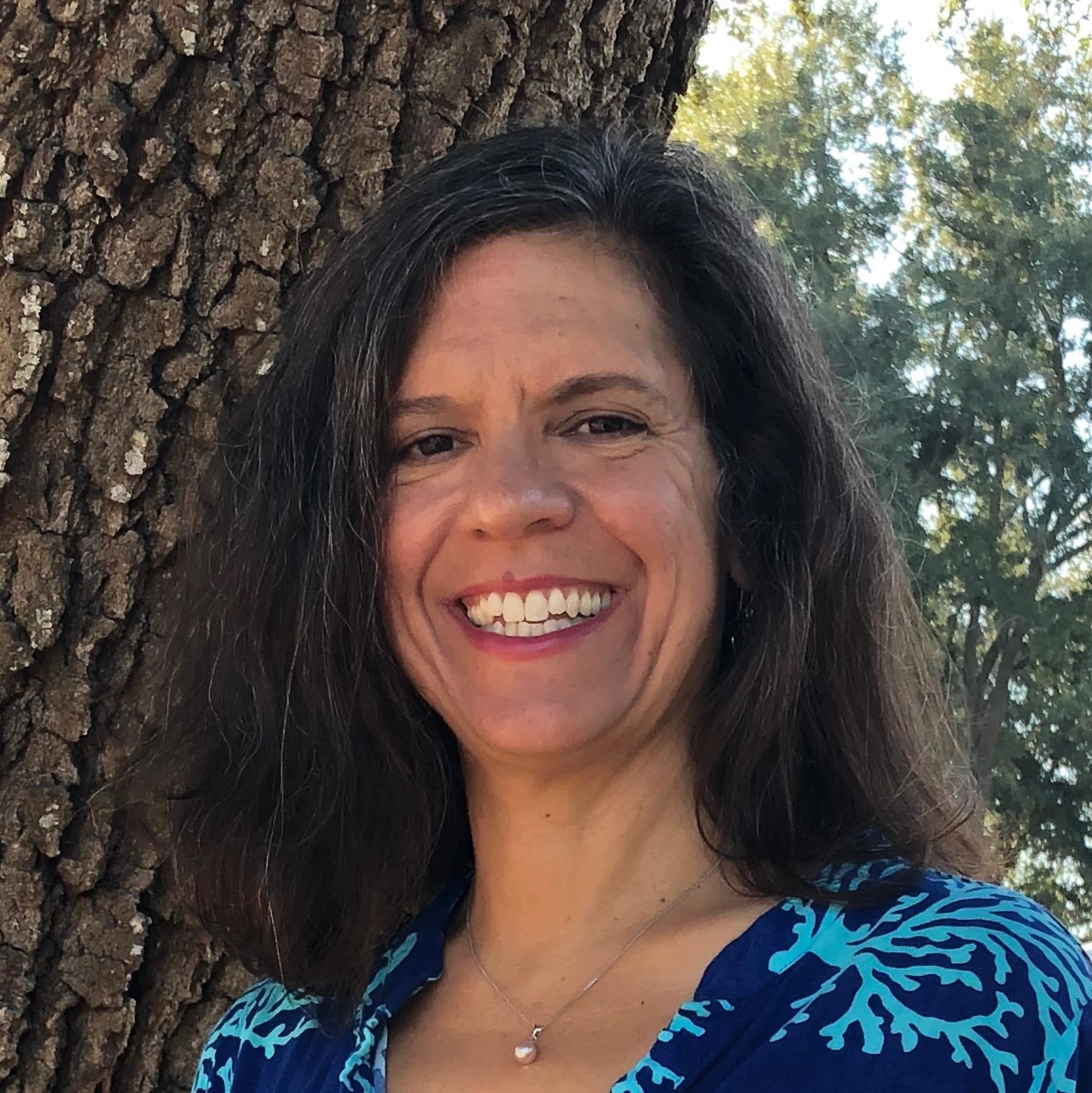
Phone:
Email:
Degrees and Certifications:
Ms. Vivian Guttierez, SPANISH TEACHER
- B.A., Spanish Education; Minor Biology
- Spanish and Theology Teacher, Chapelle High School, Metairie, LA
- Spanish Teacher, Santa Fe High School SBAC
- Spanish Teacher, Jordan Glen (K-8)
- Phono-graphics Certification
- Spanish Teacher Certification, State of FL
- Hobbies: yoga, walking, gardening, cooking, health and nutrition
- Parent of two Millhopper Montessori students and one alumni
- MMS Affiliation since 2017
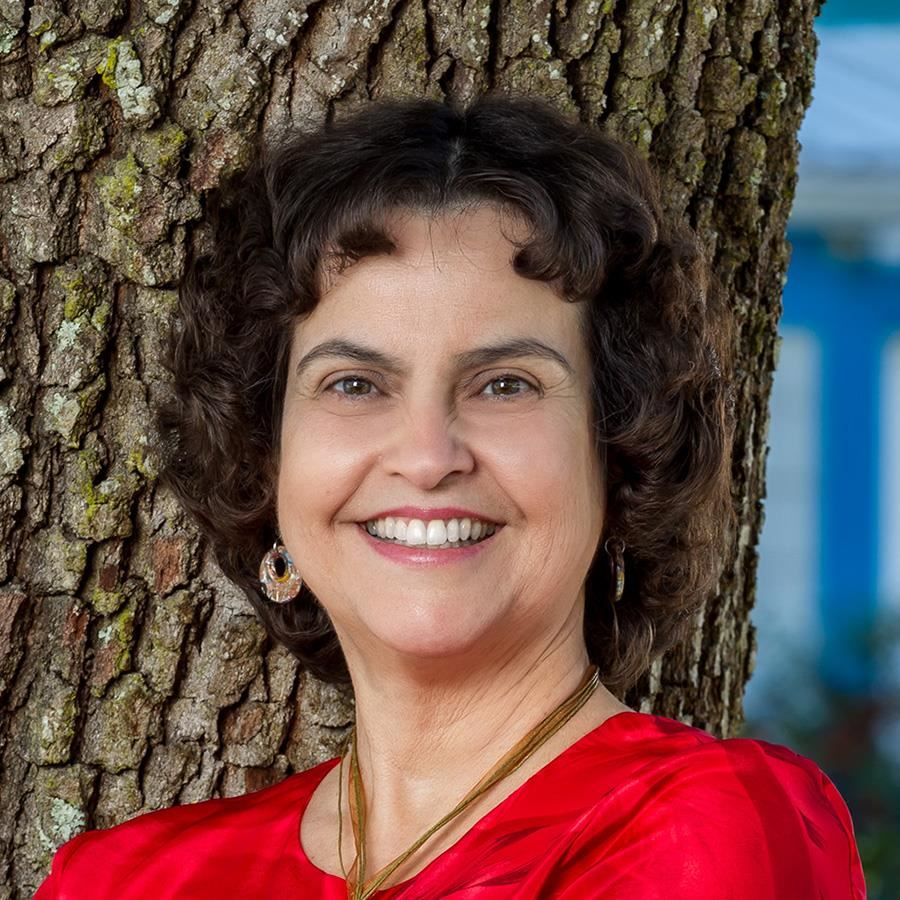
Phone:
Email:
Degrees and Certifications:
Ms. Ms. Maria Valladares, SPANISH TEACHER
- M.E., Special Education, University of Florida
- B.A., Social Studies, Secondary Education, University of Florida
- Teacher, Maximizing Foreign Language Input in the Classroom, University of Florida, 2006, 2008
- Teacher, Westwood Hills Christian School (K-12)
- Teacher, Living Faith Fellowship School (K-12)
- Hobbies: scrapbooking, reading, traveling, hosting dinners at Ronal McDonald House
- MMS Affiliation since 2013
-
TECHNOLOGY
KINDERGARTEN TECHNOLOGY
-
Kindergartners learn basic computer skills, such as using the mouse to point, click, and drag objects before progressing to practicing using the keyboard. With www.millhoppertech.com as the backbone, other applications, such as educational computer games, are incorporated into the curriculum to engage students.
LOWER ELEMENTARY (AGES 6–9) TECHNOLOGY
-
Students are taught basic typing and formatting so that they can turn their research and other writing into finished products. Students gain exposure to keyboarding and word processing basics through Open Office. Research using computers begins at this level. In addition, Montessori apps and educational games are used for independent practice and extra academic review. Teachers use their Promethean board for lessons and presentations to the class.
UPPER ELEMENTARY (AGES 9-12) TECHNOLOGY
-
The students are encouraged to use the Internet as an invaluable research tool. Students have weekly practice assignments on typing programs to build accuracy and confidence. Microsoft Office programs are used to write papers, create graphs, and design brochures and newsletters. These skills are carried over to projects in literature/composition, science, and other classes. Educational and skill-building computer games are used to enhance class work. Presentation programs such as PowerPoint, Prezi, Glogster, and Pixton, plus animation programs such as Flip Boom are introduced to encourage students to hone their presentation dynamics.
Computers are used on a daily basis and are an integral part of the classroom and curriculum. In fourth grade, students receive a class email and are introduced to all the elements of Google Apps for Education, including creating blogs, learning to properly send emails, and developing safe practices on social media. This prepares them for Middle School. All the lessons are cross-curricular in nature and coordinate with the lessons of other team teachers in the subjects of literature/composition, science, and history.
MIDDLE SCHOOL (AGES 12-14) TECHNOLOGY
-
Advanced standards build upon the Microsoft Office Suite fluency acquired in prior years, while also emphasizing desktop publishing, multimedia, and additional concepts of applied technology. Many cross-curricular opportunities manifest at this level with our science, language arts, social studies, drama, video production, and yearbook curriculums. With abundant potential to practically apply their technology skills, the technology program expands beyond the one hour of formal classroom time weekly allocated to this group.
The technology course is taught on a continuum and approached in two ways in the Middle School program. First, it is used an as extension and enrichment of other subject areas, such as research skills and Boolean search techniques for writing assignments in Language Arts; the creation of a webpage on a Spanish-speaking country to support a Spanish assignment; or the videoing and editing of a group dance routine to support a Physical Education assignment. The second use is to widen their understanding of the uses of technology in the majority of their courses. Topics of study include: research and reference, digital communication, social networking/blogging, web interfaces, 3D modeling/drawing/animation and video production.

Phone: 352-375-6773
Email:
Degrees and Certifications:
Ms. Ms. Sylvia Aslanian, TECHNOLOGY
- A.S., Technology, Visual Communications
- B.S. Information Technology, Member of Epsilon Pi Tau (The International Honor Society for Professions in Technology)
- Director of
- Biennial Shakespeare Festival
- Biennial Festival of Dionysus
- Biennial Year End Show
- MMS Spotlight Kids Performing Arts
- Developer
- MMS Technology Curriculum (based on National Technology Education Standards
- MMS Speech and Debate Curriculum (based on National Middle School Public Debate Program)
- MMS Drama Curriculum (based on Montessori Curriculum and National Standards)
- Theater Memberships
- Educational Theater Association
- Alliance for Theatre and Education
- Theater Communications Group
- FATE (Florida Association of Theatre Education)
- Parent of two Millhopper Montessori alumni
- MMS Affiliation since 1994

Phone: 352-375-6773
Email:
Degrees and Certifications:
Ms. Elizabeth Sheehan, TECHNOLOGY TEACHER
- A.A., A.S, Special Education
- Assistant Teacher Montessori Certificate
- Department of Children and Families Credential
- Hobbies: sewing
- MMS Affiliation since 2000
TECHNOLOGY GALLERY
-
Millhopper Tech
Welcome to Millhopper Montessori's School Technology website. Students can practice all lessons at home.

